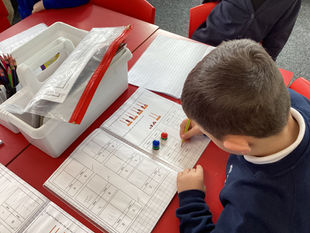Starting School
School Day
Useful Info

Maths
We love Maths at South Stanley Infant and Nursery School!
At South Stanley Infant and Nursery School, we aim for a high-quality Maths curriculum which is accessible for all children, one that will maximise the development of every child’s ability and academic achievement in all areas of Mathematics. Through a mastery approach, we aim to develop children’s fluency, problem solving and reasoning skills. The intent of our curriculum is to enable children to develop resilience in maths and enable them to explain their thinking, drawing on previous learning to help them tackle a variety of Mathematical problems. We want children to develop an enjoyment of Maths and to be confident when approaching new concepts.
Teaching of Maths
At South Stanley infant and Nursery School, our Maths teaching is progressive, each year group builds on learning from the previous year group. We use a Mastery approach to teaching Maths, following the White Rose scheme of learning, which focuses on increasing children’s fluency, mathematical thinking, reasoning and problem solving skills through a series of small steps.
The appropriate mathematical language for each year group is taught daily and children consolidate prior language learned across the years.
Our mathematics curriculum covers the following areas:
· Number and place value.
· Addition and subtraction.
· Multiplication and Division.
· Fractions.
· Measures .
· Geometry – properties of shape, position and direction.
· Statistics.
Problem Solving and Reasoning
At South Stanley Infant and Nursery School we want our children to be resilient problem solvers able to apply their mathematical knowledge and understanding to a range of contexts.
Children begin each new unit with a problem-solving activity. The problem given is of an unfamiliar but routine format – that is a problem type that children may not have experienced previously but with a clear starting point.. Staff will support children with their problem solving using an ‘I do, we do, you do approach’. During the ‘I do…’, staff will use think alouds to model the thought processes involved in approaching and solving such problems.
Then throughout the unit, children are given regular opportunities to practise and rehearse these skills with further problems linked to the mathematical skills they are covering. Children are encouraged to tackle these problems independently – before strategies are decomposed and discussed in the following lesson.
At the end of each unit, children are then challenged further with a non-routine problem where they need to use and apply the skills they have been developing to a new unfamiliar context.
In our school we have chosen to focus in particular on problems where children develop their skills of visualisation, trial and improvement and working systematically.
To further develop your child’s problem solving and reasoning skills, we will be setting a maths ‘Problem of the Month’ for you to work on at home with them. The problem will be posted on the website each month and solutions should be sent into school where a winner will be chosen from all the correct solutions.
Mastering Number
In Reception and KS1 we also have daily fluency sessions, following the NCTEM Mastering Number program. This program aims to secure firm foundations in the development of good number sense (a deep understanding of number). The aim over time is that children will leave KS1 with a good level of fluency in calculation and confidence and flexibility in number. Research shows that children with secure number sense early on will make more progress later on in Maths and across the curriculum.
Assessment
After each unit of work, children carry out a White Rose end of block assessment to check their understanding of the topic covered. Following this, at the end of each term, children carry out a termly White Rose Assessment that checks their understanding od all topics taught throughout the term
NumBots
NumBots is an online maths learning platform that helps children learn how to add and subtract, improving their fluency and recall in basic mental maths, and equipping them with maths confidence. NumBots covers subitising, number bonds, and addition and subtraction of double-digit numbers; gradually helping your pupils to build a solid conceptual understanding of number sense.
You can log in and play at home (via the browser - play.numbots.com - or free app) using the username and password sent home with your child.
Little and often
As spaced practice is more effective than blocked practice, aim for your chilld to play NumBots for 3 minutes per day, 4 times a week.





















































